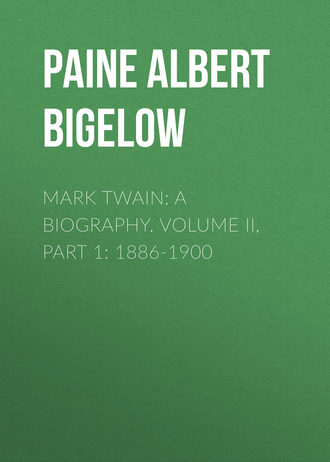
Mark Twain: A Biography. Volume II, Part 1: 1886-1900
Clemens and Cable had a pleasant enough time, and had it not been for the absence from home and the disagreeableness of railway travel, there would have been little to regret. They were a curiously associated pair. Cable was orthodox in his religion, devoted to Sunday-school, Bible reading, and church affairs in general. Clemens—well, Clemens was different. On the first evening of their tour, when the latter was comfortably settled in bed with an entertaining book, Cable appeared with his Bible, and proceeded to read a chapter aloud. Clemens made no comment, and this went on for an evening or two more. Then he said:
"See here, Cable, we'll have to cut this part of the program out. You can read the Bible as much as you please so long as you don't read it to me."
Cable retired courteously. He had a keen sense of humor, and most things that Mark Twain did, whether he approved or not, amused him. Cable did not smoke, but he seemed always to prefer the smoking compartment when they traveled, to the more respectable portions of the car. One day Clemens sand to him:
"Cable, why do you sit in here? You don't smoke, and you know I always smoke, and sometimes swear."
Cable said, "I know, Mark, I don't do these things, but I can't help admiring the way you do them."
When Sunday came it was Mark Twain's great happiness to stay in bed all day, resting after his week of labor; but Cable would rise, bright and chipper, dress himself in neat and suitable attire, and visit the various churches and Sunday-schools in town, usually making a brief address at each, being always invited to do so.
It seems worth while to include one of the Clemens-Cable programs here —a most satisfactory one. They varied it on occasion, and when they were two nights in a place changed it completely, but the program here given was the one they were likely to use after they had proved its worth:
PROGRAMRichling's visit to Kate Riley
GEO. W. CABLE
King Sollermun
MARK TWAIN
(a) Kate Riley and Ristofolo
(b) Narcisse in mourning for "Lady Byron"
(c) Mary's Night Ride
GEO. W. CABLE
(a) Tragic Tale of the Fishwife
(b) A Trying Situation
(c) A Ghost Story
MARK TWAIN
At a Mark Twain memorial meeting (November 30, 1910), where the few who were left of his old companions told over quaint and tender memories, George Cable recalled their reading days together and told of Mark Twain's conscientious effort to do his best, to be worthy of himself, regardless of all other concerns. He told how when they had been traveling for a while Clemens seemed to realize that he was only giving the audience nonsense; making them laugh at trivialities which they would forget before they had left the entertainment hall. Cable said that up to that time he had supposed Clemens's chief thought was the entertainment of the moment, and that if the audience laughed he was satisfied. He told how he had sat in the wings, waiting his turn, and heard the tides of laughter gather and roll forward and break against the footlights, time and time again, and how he had believed his colleague to be glorying in that triumph. What was his surprise, then, on the way to the hotel in the carriage, when Clemens groaned and seemed writhing in spirit and said:
"Oh, Cable, I am demeaning myself. I am allowing myself to be a mere buffoon. It's ghastly. I can't endure it any longer."
Cable added that all that night and the next day Mark Twain devoted himself to the study and rehearsal of selections which were justified not only as humor, but as literature and art.
A good many interesting and amusing things would happen on such a tour. Many of these are entirely forgotten, of course, but of others certain memoranda have been preserved. Grover Cleveland had been elected when they set out on their travels, but was still holding his position in Albany as Governor of New York. When they reached Albany Cable and Clemens decided to call on him. They drove to the Capitol and were shown into the Governor's private office. Cleveland made them welcome, and, after greetings, said to Clemens:
"Mr. Clemens, I was a fellow-citizen of yours in Buffalo a good many months some years ago, but you never called on me then. How do you explain this?"
Clemens said: "Oh, that is very simple to answer, your Excellency. In Buffalo you were a sheriff. I kept away from the sheriff as much as possible, but you're Governor now, and on the way to the Presidency. It's worth while coming to see you."
Clemens meantime had been resting, half sitting, on the corner of the Executive desk. He leaned back a little, and suddenly about a dozen young men opened various doors, filed in and stood at attention, as if waiting for orders.
No one spoke for a moment; then the Governor said to this collection of attendants:
"You are dismissed, young gentlemen. Your services are not required. Mr.
Clemens is sitting on the bells."
In Buffalo, when Clemens appeared on the stage, he leisurely considered the audience for a moment; then he said:
"I miss a good many faces. They have gone—gone to the tomb, to the gallows, or to the White House. All of us are entitled to at least one of these distinctions, and it behooves us to be wise and prepare for all."
On Thanksgiving Eve the readers were in Morristown, New Jersey, where they were entertained by Thomas Nast. The cartoonist prepared a quiet supper for them and they remained overnight in the Nast home. They were to leave next morning by an early train, and Mrs. Nast had agreed to see that they were up in due season. When she woke next morning there seemed a strange silence in the house and she grew suspicious. Going to the servants' room, she found them sleeping soundly. The alarm-clock in the back hall had stopped at about the hour the guests retired. The studio clock was also found stopped; in fact, every timepiece on the premises had retired from business. Clemens had found that the clocks interfered with his getting to sleep, and he had quieted them regardless of early trains and reading engagements. On being accused of duplicity he said:
"Well, those clocks were all overworked, anyway. They will feel much better for a night's rest."
A few days later Nast sent him a caricature drawing—a picture which showed Mark Twain getting rid of the offending clocks.
At Christmas-time they took a fortnight's holiday and Clemens went home to Hartford. A surprise was awaiting him there. Mrs. Clemens had made an adaptation of 'The Prince and the Pauper' play, and the children of the neighborhood had prepared a presentation of it for his special delectation. He knew, on his arrival home, that something mysterious was in progress, for certain rooms were forbidden him; but he had no inkling of their plan until just before the performance—when he was led across the grounds to George Warner's home, into the large room there where it was to be given, and placed in a seat directly in front of the stage.
Gerhardt had painted the drop-curtain, and assisted in the general construction of scenery and effects. The result was really imposing; but presently, when the curtain rose and the guest of honor realized what it was all about, and what they had undertaken for his pleasure, he was deeply moved and supremely gratified.
There was but one hitch in the performance. There is a place where the Prince says, "Fathers be alike, mayhap; mine hath not a doll's temper."
This was Susy's part, and as she said it the audience did not fail to remember its literal appropriateness. There was a moment's silence, then a titter, followed by a roar of laughter, in which everybody but the little actors joined. They did not see the humor and were disturbed and grieved. Curiously enough, Mrs Clemens herself, in arranging and casting the play, had not considered the possibility of this effect. The parts were all daintily played. The children wore their assumed personalities as if native to them. Daisy Warner played the part of Tom Canty, Clara Clemens was Lady Jane Grey.
It was only the beginning of The Prince and the Pauper productions. The play was repeated, Clemens assisting, adding to the parts, and himself playing the role of Miles Hendon. In her childish biography Susy says:
Papa had only three days to learn the part in, but still we were all sure that he could do it. The scene that he acted in was the scene between Miles Hendon and the Prince, the "Prithee, pour the water" scene. I was the Prince and papa and I rehearsed together two or three times a day for the three days before the appointed evening. Papa acted his part beautifully, and he added to the scene, making it a good deal longer. He was inexpressibly funny, with his great slouch hat and gait–oh such a gait! Papa made the Miles Hendon scene a splendid success and every one was delighted with the scene, and papa too. We had great fun with our "Prince and Pauper," and I think we none of us shall forget how immensely funny papa was in it. He certainly could have been an actor as well as an author.
The holidays over, Cable and Clemens were off on the circuit again. At Rochester an incident happened which led to the writing of one of Mark Twain's important books, 'A Connecticut Yankee at King Arthur's Court'. Clemens and Cable had wandered into a book-store for the purpose of finding something to read. Pulling over some volumes on one of the tables, Clemens happened to pick up a little green, cloth-bound book, and after looking at the title turned the pages rather curiously and with increasing interest.
"Cable," he said, "do you know anything about this book, the Arthurian legends of Sir Thomas Malory, Morte Arthure?"
Cable answered: "Mark, that is one of the most beautiful books in the world. Let me buy it for you. You will love it more than any book you ever read."
So Clemens came to know the old chronicler's version of the rare Round Table legends, and from that first acquaintance with them to the last days of his life seldom let the book go far from him. He read and reread those quaint, stately tales and reverenced their beauty, while fairly reveling in the absurdities of that ancient day. Sir Ector's lament he regarded as one of the most simply beautiful pieces of writing in the English tongue, and some of the combats and quests as the most ridiculous absurdities in romance. Presently he conceived the idea of linking that day, with its customs, costumes, and abuses, with the progress of the present, or carrying back into that age of magicians and armor and superstition and cruelties a brisk American of progressive ideas who would institute reforms. His note-book began to be filled with memoranda of situations and possibilities for the tale he had in mind. These were vague, unformed fancies as yet, and it would be a long time before the story would become a fact. This was the first entry:
Dream of being a knight-errant in armor in the Middle Ages. Have the notions and habits, though, of the present day mixed with the necessities of that. No pockets in the armor. No way to manage certain requirements of nature. Can't scratch. Cold in the head and can't blow. Can't get a handkerchief; can't use iron sleeve; iron gets red-hot in the sun; leaks in the rain; gets white with frost and freezes me solid in winter; makes disagreeable clatter when I enter church. Can't dress or undress myself. Always getting struck by lightning. Fall down and can't get up.
Twenty-one years later, discussing the genesis of the story, he said:
"As I read those quaint and curious old legends I suppose I naturally contrasted those days with ours, and it made me curious to fancy what might be the picturesque result if we could dump the nineteenth century down into the sixth century and observe the consequences."
The reading tour continued during the first two months of the new year and carried them as far west as Chicago. They read in Hannibal and Keokuk, and Clemens spent a day in the latter place with his mother, now living with Orion, brisk and active for her years and with her old-time force of character. Mark Twain, arranging for her Keokuk residence, had written:
Ma wants to board with you, and pay her board. She will pay you $20 a month (she wouldn't pay a cent more in heaven; she is obstinate on this point), and as long as she remains with you and is content I will add $25 a month to the sum Perkins already sends you.
Jane Clemens attended the Keokuk reading, and later, at home, when her children asked her if she could still dance, she rose, and at eighty-one tripped as lightly as a girl. It was the last time that Mark Twain ever saw his mother in the health and vigor which had been always so much a part of her personality.
Clemens saw another relative on that trip; in St. Louis, James Lampton, the original of Colonel Sellers, called.
He was become old and white-headed, but he entered to me in the same old breezy way of his earlier life, and he was all there, yet—not a detail wanting: the happy light in his eye, the abounding hope in his heart, the persuasive tongue, the miracle-breeding imagination—they were all there; and before I could turn around he was polishing up his Aladdin's lamp and flashing the secret riches of the world before me. I said to myself: "I did not overdraw him by a shade, I set him down as he was; and he is the same man to-day. Cable will recognize him."
Clemens opened the door into Cable's room and allowed the golden dream-talk to float in. It was of a "small venture" which the caller had undertaken through his son.
"Only a little thing—a mere trifle—a bagatelle. I suppose there's a couple of millions in it, possibly three, but not more, I think; still, for a boy, you know–"
It was the same old Cousin Jim. Later, when he had royally accepted some tickets for the reading and bowed his exit, Cable put his head in at the door.
"That was Colonel Sellers," he said.
CLIII
HUCK FINN COMES INTO HIS OWN
In the December Century (1884) appeared a chapter from 'The Adventures of Huckleberry Finn', "The Grangerford-Shepherdson Feud," a piece of writing which Edmund Clarence Stederian, Brander Matthews, and others promptly ranked as among Mark Twain's very best; when this was followed, in the January number, by "King Sollermun," a chapter which in its way delighted quite as many readers, the success of the new book was accounted certain. —[Stedman, writing to Clemens of this instalment, said: "To my mind it is not only the most finished and condensed thing you have done but as dramatic and powerful an episode as I know in modern literature."]
'The Adventures of Huckleberry Finn' was officially published in England and America in December, 1884, but the book was not in the canvassers' hands for delivery until February. By this time the orders were approximately for forty thousand copies, a number which had increased to fifty thousand a few weeks later. Webster's first publication venture was in the nature of a triumph. Clemens wrote to him March 16th:
"Your news is splendid. Huck certainly is a success."
He felt that he had demonstrated his capacity as a general director and Webster had proved his efficiency as an executive. He had no further need of an outside publisher.
The story of Huck Finn will probably stand as the best of Mark Twain's purely fictional writings. A sequel to Tom Sawyer, it is greater than its predecessor; greater artistically, though perhaps with less immediate interest for the juvenile reader. In fact, the books are so different that they are not to be compared—wherein lies the success of the later one. Sequels are dangerous things when the story is continuous, but in Huckleberry Finn the story is a new one, wholly different in environment, atmosphere, purpose, character, everything. The tale of Huck and Nigger Jim drifting down the mighty river on a raft, cross-secting the various primitive aspects of human existence, constitutes one of the most impressive examples of picaresque fiction in any language. It has been ranked greater than Gil Blas, greater even than Don Quixote; certainly it is more convincing, more human, than either of these tales. Robert Louis Stevenson once wrote, "It is a book I have read four times, and am quite ready to begin again to-morrow."
It is by no means a flawless book, though its defects are trivial enough. The illusion of Huck as narrator fails the least bit here and there; the "four dialects" are not always maintained; the occasional touch of broad burlesque detracts from the tale's reality. We are inclined to resent this. We never wish to feel that Huck is anything but a real character. We want him always the Huck who was willing to go to hell if necessary, rather than sacrifice Nigger Jim; the Huck who watched the river through long nights, and, without caring to explain why, felt his soul go out to the sunrise.
Two or three days and nights went by; I reckon I might say they swum by, they slid along so quiet and smooth and lovely. Here is the way we put in the time. It was a monstrous big river down there —sometimes a mile and a half wide; we run nights and laid up and hid daytimes; soon as the night was most gone we stopped navigating and tied up—nearly always in the dead water under a towhead; and then cut young cottonwoods and willows and hid the raft with them. Then we set out the lines. Next we slid into the river and had a swim, so as to freshen up and cool off; then we set down on the sandy bottom where the water was about knee deep, and watched the daylight come. Not a sound anywheres—perfectly still—just like the whole world was asleep, only sometimes the bullfrogs a-cluttering, maybe. The first thing to see, looking away over the water, was a kind of dull line—that was the woods on t'other side, you couldn't make nothing else out; then a pale place in the sky; then more paleness, spreading around; then the river softened up, away off, and warn't black anymore, but gray; you could see little dark spots drifting along, ever so far away—trading scows, and such things; and long black streaks—rafts; sometimes you could hear a sweep screaking; or jumbled up voices, it was so still, and sounds come so far; and by- and-by you could see a streak on the water which you know by the look of the streak that there's a snag there in a swift current which breaks on it and makes that streak look that way; and you see the mist curl up off the water, and the east reddens up, and the river, and you make out a log-cabin in the edge of the woods, away on the bank on t'other side of the river, being a wood-yard, likely, and piled by them cheats so you can throw a dog through it anywheres; then the nice breeze springs up, and comes fanning you over there, so cool and fresh, and sweet to smell, on account of the woods and the flowers…. And next you've got the full day, and everything smiling in the sun, and the song-birds just going it!
This is the Huck we want, and this is the Huck we usually have, and that the world has long been thankful for.
Take the story as a whole, it is a succession of startling and unique pictures. The cabin in the swamp which Huck and his father used together in their weird, ghastly relationship; the night adventure with Jim on the wrecked steamboat; Huck's night among the towheads; the Grangerford-Shepherdson battle; the killing of Boggs—to name a few of the many vivid presentations—these are of no time or literary fashion and will never lose their flavor nor their freshness so long as humanity itself does not change. The terse, unadorned Grangerford-Shepherdson episode—built out of the Darnell—Watson feuds—[See Life on the Mississippi, chap. xxvi. Mark Twain himself, as a cub pilot, came near witnessing the battle he describes.]—is simply classic in its vivid casualness, and the same may be said of almost every incident on that long river-drift; but this is the strength, the very essence of picaresque narrative. It is the way things happen in reality; and the quiet, unexcited frame of mind in which Huck is prompted to set them down would seem to be the last word in literary art. To Huck, apparently, the killing of Boggs and Colonel Sherburn's defiance of the mob are of about the same historical importance as any other incidents of the day's travel. When Colonel Sherburn threw his shotgun across his arm and bade the crowd disperse Huck says:
The crowd washed back sudden, and then broke all apart and went tearing off every which way, and Buck Harkness he heeled it after them, looking tolerable cheap. I could a staid if I'd a wanted to, but I didn't want to.
I went to the circus, and loafed around the back side till the watchman went by, and then dived in under the tent.
That is all. No reflections, no hysterics; a murder and a mob dispersed, all without a single moral comment. And when the Shepherdsons had got done killing the Grangerfords, and Huck had tugged the two bodies ashore and covered Buck Grangerford's face with a handkerchief, crying a little because Buck had been good to him, he spent no time in sentimental reflection or sermonizing, but promptly hunted up Jim and the raft and sat down to a meal of corn-dodgers, buttermilk, pork and cabbage, and greens:
There ain't nothing in the world so good, when it is cooked right; and while I eat my supper we talked, and had a good time. I was powerful glad to get away from the feuds, and so was Jim to get away from the swamp. We said there warn't no home like a raft, after all. Other places do seem so cramped up and smothery, but a raft don't; you feel mighty free and easy and comfortable on a raft.
It was Huck Finn's morality that caused the book to be excluded from the Concord Library, and from other libraries here and there at a later day. The orthodox mental attitude of certain directors of juvenile literature could not condone Huck's looseness in the matter of statement and property rights, and in spite of New England traditions, Massachusetts librarians did not take any too kindly to his uttered principle that, after thinking it over and taking due thought on the deadly sin of abolition, he had decided that he'd go to hell rather than give Jim over to slavery. Poor vagrant Ben Blankenship, hiding his runaway negro in an Illinois swamp, could not dream that his humanity would one day supply the moral episode of an immortal book.
Able critics have declared that the psychology of Huck Finn is the book's large feature: Huck's moral point of view—the struggle between his heart and his conscience concerning the sin of Jim's concealment, and his final decision of self-sacrifice. Time may show that as an epic of the river, the picture of a vanished day, it will rank even greater. The problems of conscience we have always with us, but periods once passed are gone forever. Certainly Huck's loyalty to that lovely soul Nigger Jim was beautiful, though after all it may not have been so hard for Huck, who could be loyal to anything. Huck was loyal to his father, loyal to Tom Sawyer of course, loyal even to those two river tramps and frauds, the King and the Duke, for whom he lied prodigiously, only weakening when a new and livelier loyalty came into view—loyalty to Mary Wilks.
The King and the Duke, by the way, are not elsewhere matched in fiction. The Duke was patterned after a journeyman-printer Clemens had known in Virginia City, but the King was created out of refuse from the whole human family—"all tears and flapdoodle," the very ultimate of disrepute and hypocrisy—so perfect a specimen that one must admire, almost love, him. "Hain't we all the fools in town on our side? and ain't that a big enough majority in any town?" he asks in a critical moment—a remark which stamps him as a philosopher of classic rank. We are full of pity at last when this pair of rapscallions ride out of the history on a rail, and feel some of Huck's inclusive loyalty and all the sorrowful truth of his comment: "Human beings can be awful cruel to one another."
The "poor old king" Huck calls him, and confesses how he felt "ornery and humble and to blame, somehow," for the old scamp's misfortunes. "A person's conscience ain't got no sense," he says, and Huck is never more real to us, or more lovable, than in that moment. Huck is what he is because, being made so, he cannot well be otherwise. He is a boy throughout—such a boy as Mark Twain had known and in some degree had been. One may pettily pick a flaw here and there in the tale's construction if so minded, but the moral character of Huck himself is not open to criticism. And indeed any criticism of this the greatest of Mark Twain's tales of modern life would be as the mere scratching of the granite of an imperishable structure. Huck Finn is a monument that no puny pecking will destroy. It is built of indestructible blocks of human nature; and if the blocks do not always fit, and the ornaments do not always agree, we need not fear. Time will blur the incongruities and moss over the mistakes. The edifice will grow more beautiful with the years.









